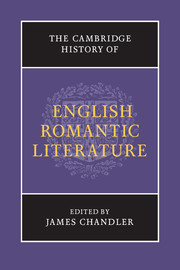Book contents
- Frontmatter
- Introduction
- Part I The Ends of Enlightenment
- Part II Geographies: The Scenes of Literary Life
- 5 London in the 1790s
- 6 Edinburgh and Lowland Scotland
- 7 Romantic Ireland: 1750–1845
- 8 France, Germany, America
- 9 The ‘warm south’
- 10 Country matters
- 11 Romanticism and the wider world: poetry, travel literature and empire
- 12 The homes of England
- 13 Writing, reading and the scenes of war
- 14 Regency London
- Part III Histories: Writing in the New Movements
- Part IV The Ends of Romanticism
- Chronology
- Bibliographies
- Index
- 1 A New Pocket Map of the Cities of London and Westminster; with the Borough of Southwark, Comprehending the new Buildings and other Alterations, 3rd edn (London: William Faden, 1790).">
- References
12 - The homes of England
from Part II - Geographies: The Scenes of Literary Life
Published online by Cambridge University Press: 28 May 2009
- Frontmatter
- Introduction
- Part I The Ends of Enlightenment
- Part II Geographies: The Scenes of Literary Life
- 5 London in the 1790s
- 6 Edinburgh and Lowland Scotland
- 7 Romantic Ireland: 1750–1845
- 8 France, Germany, America
- 9 The ‘warm south’
- 10 Country matters
- 11 Romanticism and the wider world: poetry, travel literature and empire
- 12 The homes of England
- 13 Writing, reading and the scenes of war
- 14 Regency London
- Part III Histories: Writing in the New Movements
- Part IV The Ends of Romanticism
- Chronology
- Bibliographies
- Index
- 1 A New Pocket Map of the Cities of London and Westminster; with the Borough of Southwark, Comprehending the new Buildings and other Alterations, 3rd edn (London: William Faden, 1790).">
- References
Summary
In the homes of England, Romantic writers struggled to fix the proper boundaries between publicity and privacy, seeking to elaborate new forms of domesticity that would allow houses and households to function at once as the locus of family life and the central hub from which an increasingly British state formation could radiate. Dissonance between public and private conceptions of the home is a hallmark of Romantic poetry and fiction, but so too is writers’ insistence (often rehearsed in their own domestic histories) that only by rejecting neat binary distinctions between public and private spheres could the home effectively foster Romantic sensibilities and national well-being. The homes that emerge from Romantic writing are in consequence above all else historic homes: they figure as the domestic markers of a public history, not as havens from the changing outside world.
Economic, political and ideological developments all worked to underline the antinomies of domestic space in Romantic writing. The industrial and consumer revolutions disrupted established patterns of household use, introducing new modes of production, novel systems of political economy and an unprecedented, imperial range of household goods which writers struggled to accommodate in verse and fiction. By attempting to displace political power from its twin preserves in the aristocratic mansion and the Houses of Parliament, radical and patriotic popular political movements further problematized the home as a scene of literary life. Both the rise of Gothic fictions and the increasing prominence (and popularity) of women authors contributed decisively to these destabilizing developments.
Keywords
- Type
- Chapter
- Information
- The Cambridge History of English Romantic Literature , pp. 293 - 313Publisher: Cambridge University PressPrint publication year: 2009



